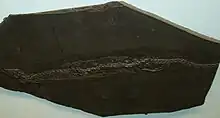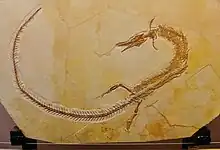Pleurosauridae
Pleurosauridae is an extinct family of sphenodontian reptiles, known from the Jurassic of Europe. Members of the family had long-snake like bodies with reduced limbs that were adapted for aquatic life in marine environments. It contains two genera, Palaeopleurosaurus, which is known from the Early Jurassic (Toarcian) Posidonia Shale of Germany, as well as Pleurosaurus from the Late Jurassic of Germany and France. Paleopleurosaurus is more primitive than the later Pleurosaurus, with a skull similar to those of other sphenodontians, while that of Pleurosaurus is highly modified relative to other sphendontians. They likely swam via anguilliform locomotion.[1] Vadasaurus and Derasmosaurus from the Late Jurassic and Early Cretaceous of Europe have been placed as part of this family in some studies, but lack the body elongation that typifies the other two genera.[2][3]
| Pleurosaurids Temporal range: Early Jurassic - Early Cretaceous, | |
|---|---|
 | |
| Fossil of Palaeopleurosaurus | |
 | |
| Fossil of Pleurosaurus | |
| Scientific classification | |
| Domain: | Eukaryota |
| Kingdom: | Animalia |
| Phylum: | Chordata |
| Class: | Reptilia |
| Order: | Rhynchocephalia |
| Suborder: | Sphenodontia |
| Family: | †Pleurosauridae Lydekker, 1888 |
| Genera | |
References
- Dupret, V. (2004). The pleurosaurs: anatomy and phylogeny. Revue de Paléobiologie, 9: 61-80.
- Simões, Tiago R.; Caldwell, Michael W.; Pierce, Stephanie E. (December 2020). "Sphenodontian phylogeny and the impact of model choice in Bayesian morphological clock estimates of divergence times and evolutionary rates". BMC Biology. 18 (1). doi:10.1186/s12915-020-00901-5. ISSN 1741-7007. S2CID 227332314.
- Chambi-Trowell, Sofia A. V.; Martinelli, Agustín G.; Whiteside, David I.; Vivar, Paulo R. Romo de; Soares, Marina Bento; Schultz, Cesar L.; Gill, Pamela G.; Benton, Michael J.; Rayfield, Emily J. (2021-06-03). "The diversity of Triassic South American sphenodontians: a new basal form, clevosaurs, and a revision of rhynchocephalian phylogeny". Journal of Systematic Palaeontology. 19 (11): 787–820. doi:10.1080/14772019.2021.1976292. ISSN 1477-2019. S2CID 240487298.